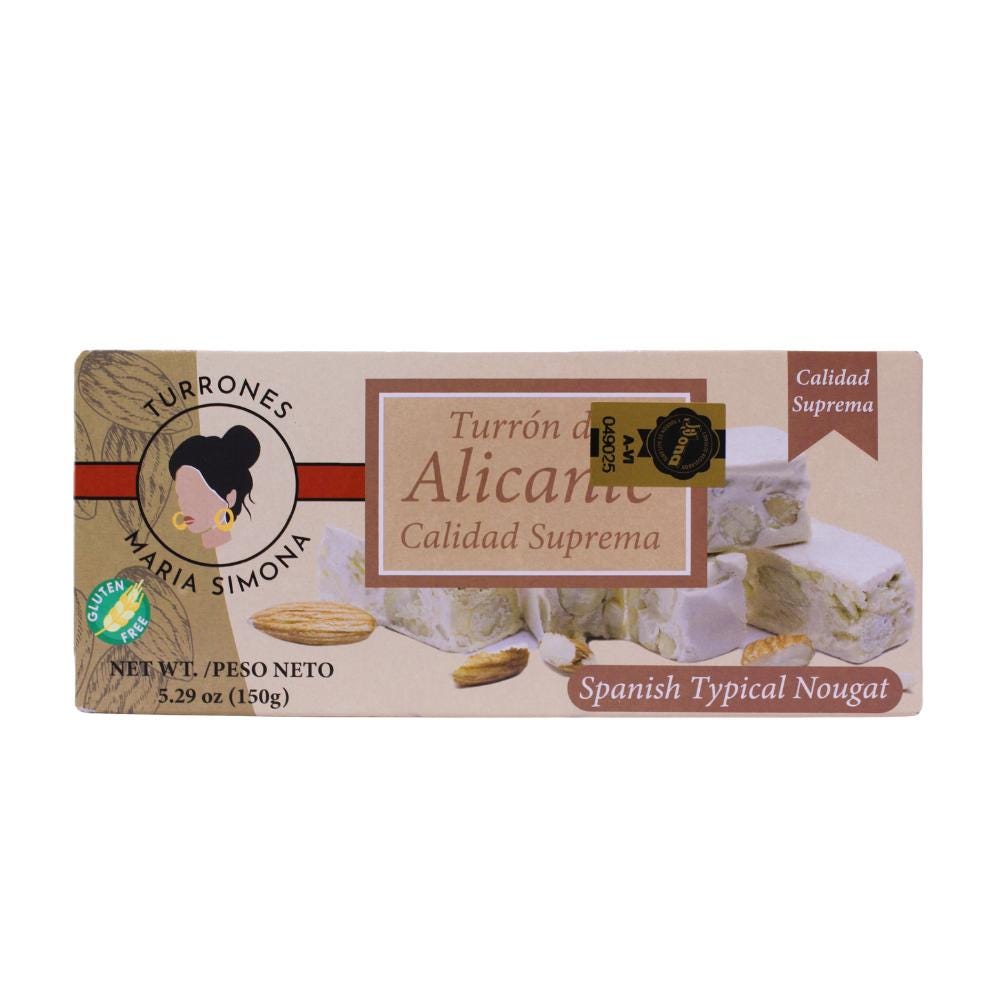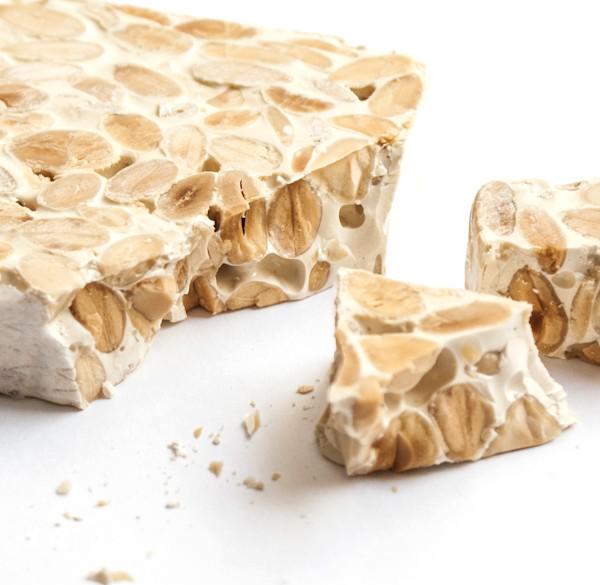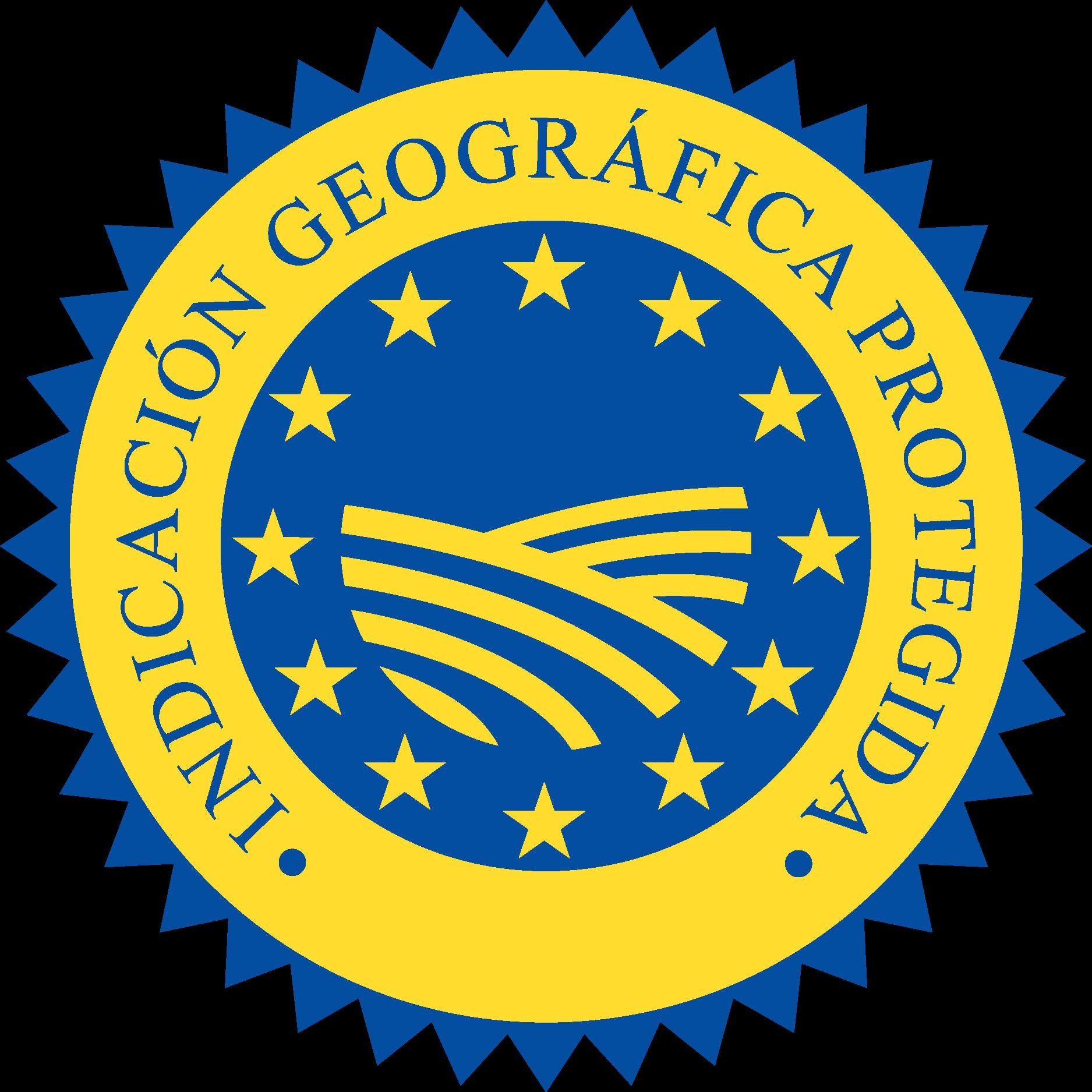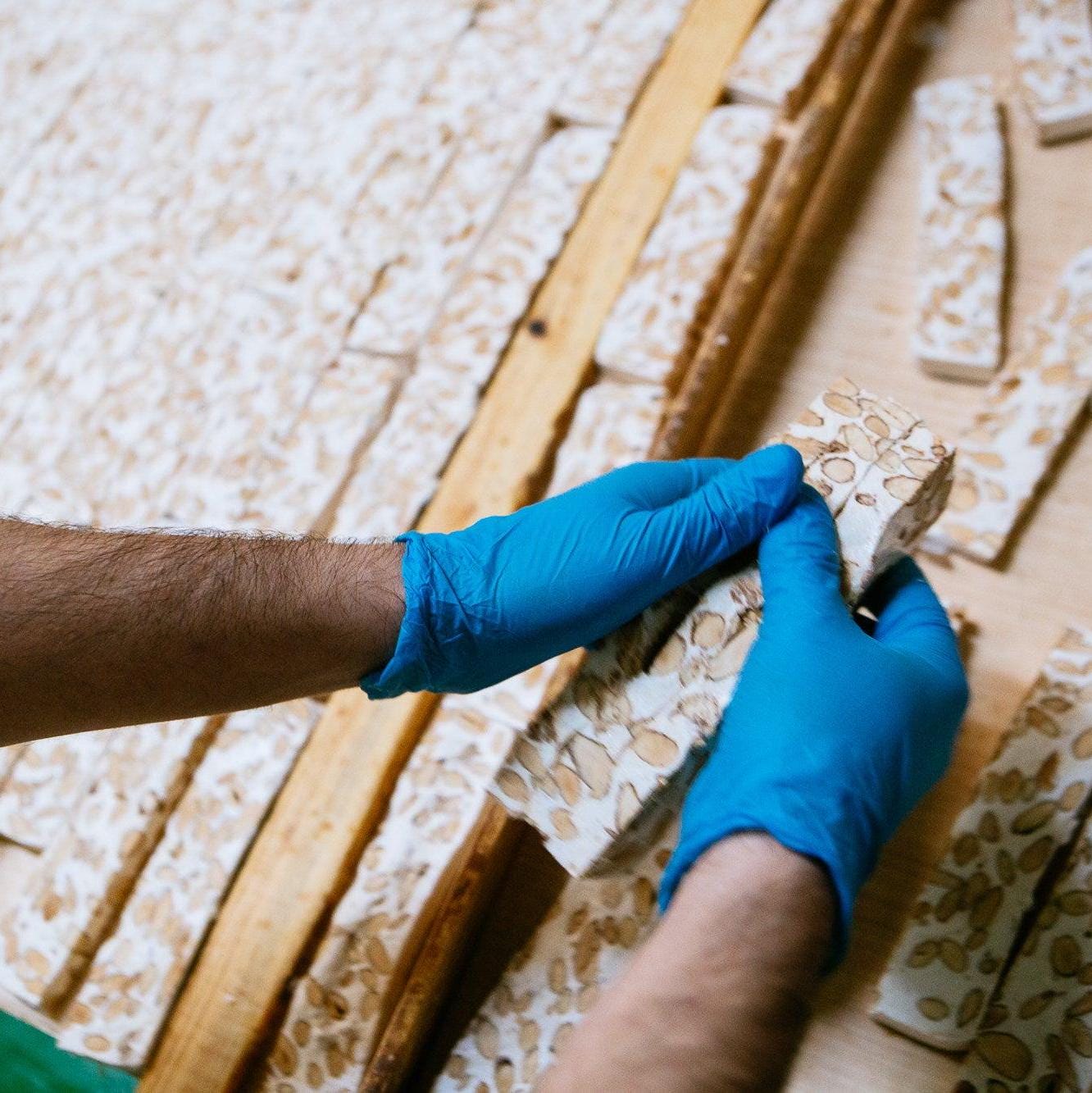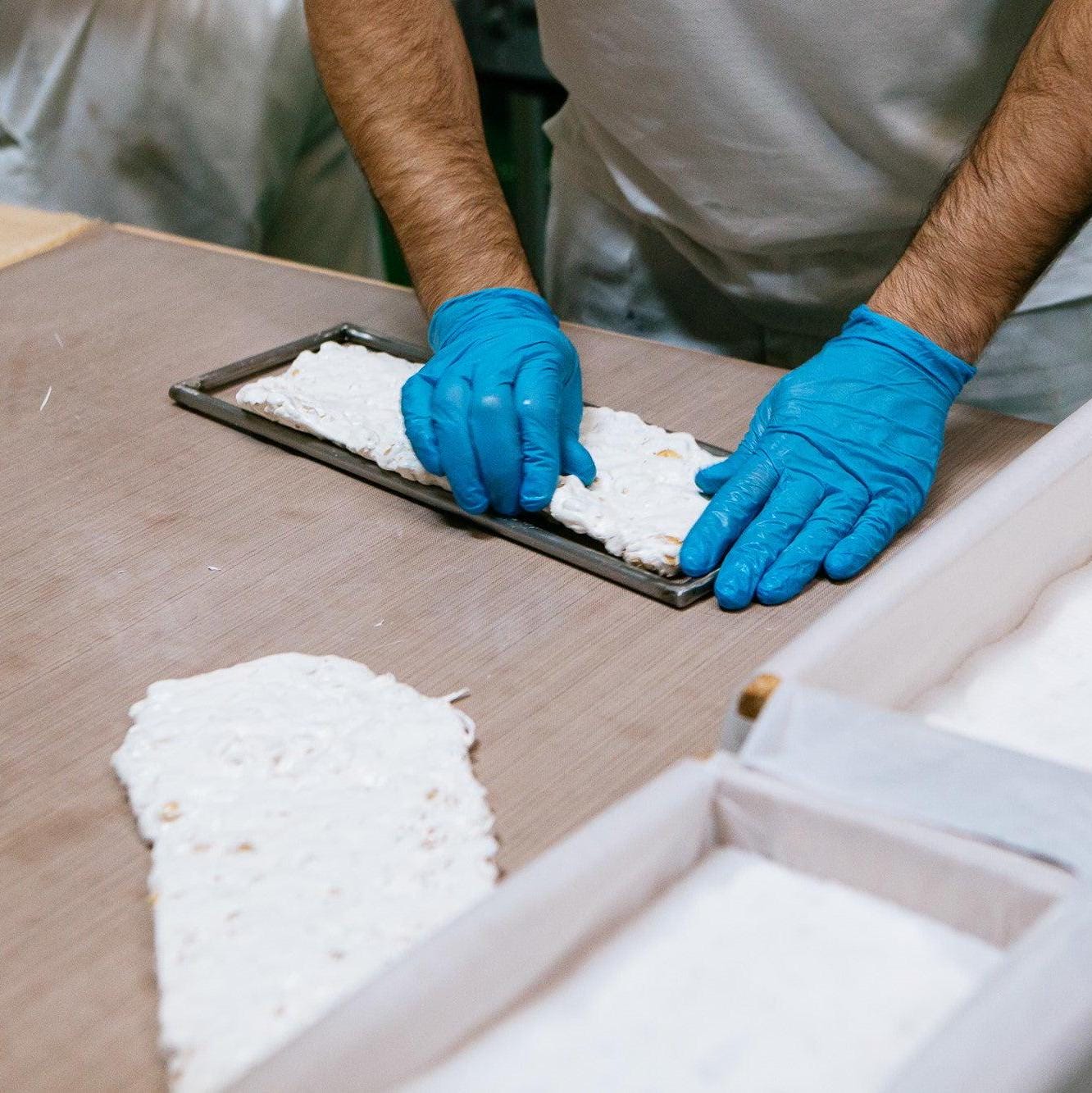Turrón de Alicante PGI | Hard Spanish nougat, supreme quality | A tradition to savor - Treat yourself to the best - Gluten-free
Turrón de Alicante PGI | Hard Spanish nougat, supreme quality | A tradition to savor - Treat yourself to the best - Gluten-free
$12.22
The production of Maria Simona's Alicante nougat follows the traditional recipe
Net weight: 5.3 oz
Shelf life of Alicante Turron: 9 months minimum.
Once opened, store in a cool, dry, dark place away from light and moisture, either in its original packaging or wrapped in aluminum foil or film, then in an airtight container. A common mistake is to store nougat in the refrigerator, which only alters its organoleptic properties as well as its aroma and texture.
Ingredients: 60% roasted almonds, sugar, glucose syrup, 12% honey, wafer coating (potato starch and sunflower oil) and egg white. May contain traces of peanuts, sesame and hazelnuts.
This product does not contain gluten, making it suitable for coeliacs.
Maria Simona's hard turron from Alicante has a designation of origin and is protected by the Regulatory Council of Jijona.
The history of Alicante turron
Although no one can deny the close connection between the city of Alicante and this sweet, it is unclear exactly when and how the "original" nougat appeared. Almonds and honey were already a common food in Greece and Rome, used to energize Olympic athletes. Spanish nougat also has some similarities to Arabic baklava. It is widely believed that the recipe originated in Arab countries, but there is no evidence to support this.
In any case, this candy has an importance for the community:
– Firstly, we know that as early as 1582, nougat was an important element of Christmas culture in Alicante, as a municipal document from the time mentions that at Christmas time, workers received Spanish nougat as wages.
– Then, in the play “La Generosa Paliza” by Lope de Rueda, in 1570, the nougat around which the plot revolves is called “turron d’Alicante”.
– Finally, in 1595, Spanish nougat must have been a real passion in the city, because King Philip II was forced to write a letter asking to limit the city's spending on turron and fig bread.
Although the town eventually stopped producing Spanish nougat due to a trade dispute, its name remains a reference point, associated with the hard variant of this sweet.
Terms & Conditions and Right of Withdrawal
Shipping from France
Processing time
3-5 business days
Customs and import taxes
Buyers are responsible for any customs and import taxes that may apply. I'm not responsible for delays due to customs.
Payment Options
Returns & Exchanges
I don't accept returns, exchanges, or cancellations
But please contact me if you have any problems with your order.
Privacy policy
Politique de protection des données personnelles (RGPD)
Relais Gourmet
1. Responsable du traitement
Le responsable du traitement des données personnelles est :
Relais Gourmet
14 rue Burugoria
64700 Hendaye – France
Email : contact@relaisgourmet.com
Relais Gourmet attache une importance particulière à la protection des données personnelles et s’engage à respecter le Règlement Général sur la Protection des Données (RGPD – UE 2016/679) ainsi que la législation française en vigueur.
2. Données personnelles collectées
Relais Gourmet est susceptible de collecter les données suivantes :
• Identité : nom, prénom
• Coordonnées : adresse postale, adresse email, numéro de téléphone
• Informations de commande : produits commandés, montant, historique d’achats
• Données de facturation et de livraison
• Données de navigation (cookies, adresse IP, pages consultées)
Les données sont collectées uniquement lorsque cela est nécessaire (commande, création de compte, formulaire de contact, inscription newsletter).
3. Finalités du traitement
Les données personnelles sont utilisées pour :
• Le traitement et la gestion des commandes
• La livraison des produits
• La facturation et la comptabilité
• Le service client et le suivi des demandes
• L’envoi d’informations commerciales ou newsletters (si consentement donné)
• L’amélioration du site et de l’expérience utilisateur
• Le respect des obligations légales et fiscales
4. Base légale du traitement
Les traitements reposent sur :
• L’exécution d’un contrat (commande, livraison)
• Le consentement de l’utilisateur (newsletter, prospection)
• L’obligation légale (facturation, conservation comptable)
• L’intérêt légitime de Relais Gourmet (amélioration du service, sécurité du site)
5. Durée de conservation des données
Les données sont conservées :
• Données clients : pendant la durée de la relation commerciale + 5 ans
• Données de facturation : 10 ans (obligation légale)
• Données marketing : 3 ans après le dernier contact
• Cookies : selon la durée définie dans la politique cookies
6. Destinataires des données
Les données personnelles peuvent être transmises uniquement à :
• Prestataires de paiement sécurisés
• Transporteurs et services de livraison
• Prestataires techniques (hébergement, maintenance du site)
Relais Gourmet ne vend jamais les données personnelles à des tiers.
7. Sécurité des données
Relais Gourmet met en œuvre des mesures techniques et organisationnelles appropriées pour garantir la sécurité, la confidentialité et l’intégrité des données personnelles (accès restreint, hébergement sécurisé, protocoles SSL).
8. Droits des utilisateurs
Conformément au RGPD, vous disposez des droits suivants :
• Droit d’accès à vos données
• Droit de rectification
• Droit à l’effacement (droit à l’oubli)
• Droit à la limitation du traitement
• Droit d’opposition
• Droit à la portabilité des données
Pour exercer vos droits, vous pouvez contacter :
contact@relaisgourmet.com
Une réponse vous sera apportée dans un délai maximum d’un mois.
9. Cookies
Le site www.relaisgourmet.com utilise des cookies pour :
• Assurer le bon fonctionnement du site
• Mesurer l’audience
• Améliorer l’expérience utilisateur
Un bandeau de gestion des cookies permet à l’utilisateur d’accepter ou de refuser les cookies non essentiels.
10. Réclamation
Si vous estimez que vos droits ne sont pas respectés, vous pouvez introduire une réclamation auprès de la CNIL (www.cnil.fr).
11. Mise à jour de la politique
Relais Gourmet se réserve le droit de modifier la présente politique à tout moment afin de garantir sa conformité avec la réglementation en vigueur.
Frequently Asked Questions
D'où viennent les produits Relais Gourmet ?
Nos produits sont d'origine du Sud-Ouest de la France, région de tradition du bon Foie Gras.
Quelle qualité garantit Relais Gourmet à travers ses produits ?
Chez Relais Gourmet, chaque produit est choisi et élaboré avec une exigence simple : le respect absolu du goût et du produit. Nos Foies Gras sont sélectionnés pour leur qualité irréprochable et sont fabriqués sans conservateur, sans additif, sans colorant. Nous privilégions des recettes courtes, lisibles et honnêtes, où seuls les ingrédients essentiels s’expriment. La texture est naturelle, le goût est franc et équilibré, la conservation est maîtrisée sans artifices. Relais Gourmet garantit ainsi des produits authentiques, fidèles au savoir-faire gastronomique, pensés pour être dégustés et offerts en toute confiance. Le vrai luxe, pour nous, c’est la simplicité et la transparence.
Pourquoi notre Foie Gras est-il un Foie Gras de qualité ?
Parce qu’il va à l’essentiel. Notre Foie Gras est élaboré sans conservateur, sans additif et sans colorant. Rien pour masquer, rien pour tricher. Juste une matière première rigoureusement sélectionnée, un assaisonnement précis et un savoir-faire maîtrisé. Sa texture est naturelle, jamais pâteuse, son goût est franc, équilibré et long en bouche. Nous faisons le choix du Foie Gras entier, celui qui respecte le produit et le plaisir de dégustation. Un Foie Gras authentique, lisible, que vous pouvez servir en toute confiance… et savourer sans compromis.
Comment bien déguster un bon Foie Gras ?
Déguster un Foie Gras est un moment de plaisir… à condition de respecter quelques règles simples. Placez le du réfrigérateur 45/60 minutes avant dégustation pour révéler pleinement ses arômes. Utilisez un couteau à lame lisse, passé sous l’eau chaude, pour une coupe nette. Servez-le sur un pain neutre (pain de campagne ou brioche légère), sans le surcharger. Une pincée de fleur de sel suffit. Le Foie Gras se savoure lentement, en petite quantité, pour apprécier sa texture fondante et son goût long en bouche. Un produit noble, sans conservateur, sans additif, sans colorant, qui se suffit à lui-même.
Conservation du Foie gras ?
Le Foie Gras est l’un des rares produits gastronomiques qui se conserve longtemps… lorsqu’il est bien fabriqué. En conserve, un Foie Gras de qualité peut se garder plusieurs années à température ambiante, sans conservateur, grâce à un procédé naturel appelé l’appertisation. Il suffit de le stocker dans un endroit frais et sec, à l’abri de la lumière. Une fois ouvert, il se conserve 48 à 72 heures au réfrigérateur, bien filmé ou dans un récipient hermétique. Cette longue conservation permet d’acheter son Foie Gras à l’avance, de l’avoir toujours sous la main et de l’ouvrir au bon moment, sans stress ni gaspillage

